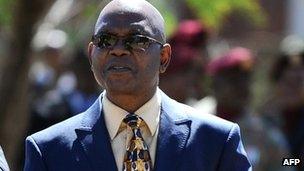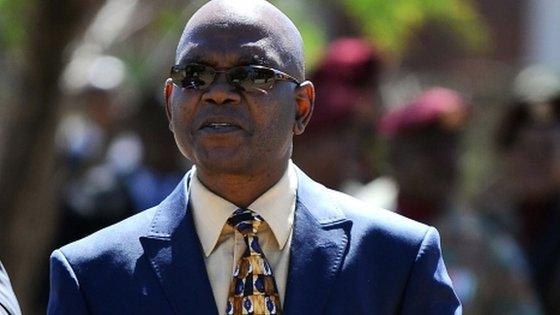Murky world of South African politics
- Published

Lt Gen Mdluli is accused of stealing funds and hiring his relatives as secret agents
"Glass half-full or half-empty?" I've never known a country that provokes more obsessive, anxious debate about the future than South Africa - a miraculous, maddening, soap opera of a nation that seems to sneer disdainfully at the very idea that it might simply muddle through.
I've always preferred the view and the clientele in the "half-full" camp, and tend to greet the latest statistics about exam failures and unemployment with the disclaimer that, long-term, things can go up as well as down.
But there is one issue that sometimes nudges me towards the pessimists, with their smugly folded arms and "told you so" smiles. And right now that issue is making all the headlines here, external.
The Richard Mdluli scandal is murky, complicated and unresolved. At a basic level, it is about the state's struggle to pursue serious allegations of fraud and corruption, and possibly murder, against one of South Africa's most senior policemen - the head of the crime intelligence unit.
Lt Gen Mdluli is accused of stealing funds from a secret service account and hiring his relatives as secret agents. He also faces older allegations that he arranged the death of a lover's husband.
In response, Mr Mdluli has claimed he is the victim of a sophisticated plot by powerful enemies who unfairly accuse him of being President Jacob Zuma's political attack dog. He has been suspended from his job, then reinstated, and finally shuffled to a less prominent post.
Perhaps this will all blow over. The optimists will reasonably point out that the authorities tend to move slowly and clumsily here, but often reach the right conclusions in the end. Give them time. Let justice take its course - after all, other senior policemen have ended up in jail, and plenty of other democracies have experienced worse growing pains. Surely South Africa has too boisterous a political culture to allow things to get out of hand?
But the pessimists argue, external, convincingly, that the Mdluli scandal is further proof of the politicisation of South Africa's police and prosecuting authorities; a contamination that began during the presidency of Thabo Mbeki, external was strengthened by the controversial decision to drop corruption charges against his successor, Jacob Zuma, external, and is now being entrenched as Mr Zuma and his allies seek to secure a second term in office by ensuring that the security services are not only loyal to their man, but willing to do whatever it takes to ensure victory.
"This is how a democracy becomes a police state," said one commentator, external, in a country already alarmed by the ruling party's draconian moves to restrict press freedoms, external.
No-one - well, no-one credible - is suggesting that South Africa is poised to follow Zimbabwe's descent into the abyss. But as many countries have found to their cost, the corruption of institutions is dangerous and hard to reverse.
- Published10 May 2012

- Published9 July 2024

